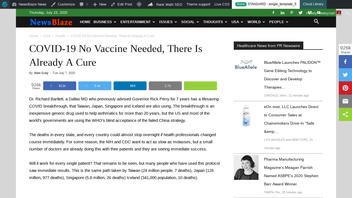
Is there already a cure for COVID-19? No, that's not true: No medicines have been shown to prevent or cure coronavirus, according to global health experts. The race is on, however, to find viable treatments.
The claim was reported in an article (archived here) published by NewsBlaze on July 7, 2020. Titled "COVID-19 No Vaccine Needed, There Is Already A Cure," it opened:
Dr. Richard Bartlett, a Dallas MD who previously advised Governor Rick Perry for 7 years has a lifesaving COVID breakthrough, that Taiwan, Japan, Singapore and Iceland are also using. The breakthrough is an inexpensive generic drug used to help asthmatics for more than 20 years, but the US and most of the world's governments are using the WHO's blind acceptance of the failed China strategy.
Users on social media saw this title, description and thumbnail:
COVID-19 No Vaccine Needed, There Is Already A Cure - NewsBlaze News
Dr. Richard Bartlett, a Dallas MD who advised Governor Rick Perry for 7 years has a lifesaving #COVID breakthrough that Taiwan, Japan, Singapore and Iceland use
The article reported on a 31-minute YouTube video of Bartlett, who appeared on the conservative talk show "America, Can We Talk?" The video has gone viral, with more than 4 million views at the time of writing. It can be seen here:
Bartlett made a number of claims on the show. He said "we already have an answer for this," in reference to COVID-19 and alleged to have a "silver bullet." The doctor pointed to the relatively low number of deaths in Taiwan, Japan, Singapore and Iceland as evidence for his claims. Here's some of what he said:
What they're doing is an inhaled steroid, so my silver bullet is inhaled budesonide ... It's an asthma medicine. It's a respiratory anti-inflammatory for COVID, which is a respiratory inflammatory disease. And it works -- 100% of my patients are alive. I've been treating this since March.
Unfortunately, and contrary to what Bartlett proclaimed, there is no known cure for coronavirus. That's according to experts at both the World Health Organization and the Centers for Disease Control and Prevention.
Shortly after Bartlett made his comments, medical professionals in his home state of Texas weighed in, urging caution. NewsWest 9 quoted Midland Health CEO Russell Meyers as saying:
People are out there saying it works, but there's no scientific proof, no carefully evaluated peer review studies that prove the efficacy of those treatments.
Indeed, broad generalizations cannot be made from Bartlett's anecdotal experience with his patients.
But what about the experiences of Taiwan, Japan, Singapore and Iceland? Does what happened in those countries help support his claims?
No.
While it's true that those countries have reported low death tolls, at least as compared to the U.S., it's not at all clear that doctors in those countries have adopted the widespread use of budesonide. Lead Stories could find no proof that such policies exist. Also, those cited countries, in addition to having few deaths attributable to coronavirus, have relatively few confirmed cases. That means that the actual rate at which infected people die in those countries is actually not much different than in a number of other countries.
Let's take a look at the numbers, as provided by Johns Hopkins University, which tracks COVID-19 cases worldwide. In Japan, for example, there have been 28,874 confirmed cases and 994 reported deaths. The death/case ratio, then, is roughly 0.03, which is the same as in the U.S., which has reported 4,073,243 coronavirus cases and 144,734 deaths.
If doctors in Japan were using an effective treatment that U.S. doctors were not, why wouldn't that ratio be different?
It's not different because there's no "silver bullet."
Of note, there was a small case series in Japan where researchers observed possible benefit in three patients with mild to moderate COVID-19 pneumonia following oral inhalation of ciclesonide, which is an inhaled corticosteroid like budesonide. Without a control group, however, it's not possible to know whether those patients would have improved on their own. That's according to the American Society of Hospital Pharmacists (ASHP), which reports that "there are currently no published studies specifically evaluating use of inhaled corticosteroids in patients with COVID-19." ASHP also reports that several clinical trials evaluating the use of inhaled corticosteroids are either in the planning stages or already underway.
Bartlett has written a paper on his breakthrough findings, according to the NewsBlaze article, which lamented the time it takes for papers to be peer reviewed and published. Lead Stories attempted to reach out to Bartlett for a copy of his study and to comment for this story. His voice mailbox was full. We will continue to try to contact Bartlett and update this story, if needed, once he responds.
Bottom line: There's a lot we still don't know about the novel coronavirus, but we do know that there is no known cure.

















